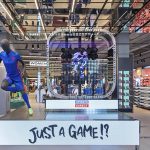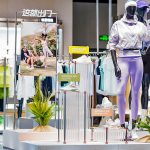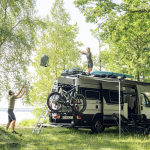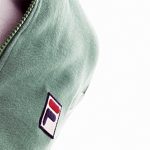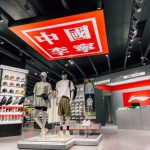Emerald Holding Inc., the parent of Outdoor Retailer, Surf Expo and other trade shows, saw second-quarter revenues collapse as it was forced to cancel 60 events and postpone 14 others due to COVID-19. But company officials said it’s making “significant progress” with an ongoing organizational restructure and its virtual events are seeing a strong response.
On a conference call with analysts, Brian Field, interim president and CEO, said the company hosted more than 140 webinars and built an internal library of over 300 podcasts. It also hosted a small number of virtual trade shows, with several more scheduled in the second half of the year.
“These virtual shows have many of the same features found at our live events, including keynote speakers, awards and virtual booths, allowing our exhibitors to load their products and host virtual meetings with buyers,” said Field. “While the feedback we’ve received from our customers is enthusiastic, they also note that they do not replace the value found in face-to-face in traditional, in-person shows and they’re outspoken in their desire to return to live events once the medium is safe. That said, we believe that there is an emergent hybrid model, whereby virtual shows will complement live events over the year.”
The virtual shows also aren’t as lucrative. Emerald projects a modest revenue opportunity in the $5 million to $10 million range at a strong contribution margin.
Said Field, “In the near-term, the more important value of these events is our ability to engage with our exhibitors year-round, and to provide them commercial solutions, particularly in today’s environment. These platforms also serve as meaningful new customer acquisition vehicles as well. Over this past quarter, our webinar and virtual event products have generated over 50,000 new customer prospects. Our team will continue to innovate in the digital space as well as explore new products and services, as we continue to expand the value that we provide to our customers.”
Organizational Restructure Expected To Drive Efficiencies
Field also said the COVID-19 disruption is enabling Emerald to streamline and unify many processes across the organization. He said, “When I first joined Emerald, a little over a year ago, it was clear to me that the company’s challenges were largely the result of poor execution, a lack of accountability and a siloed organizational structure, all of which we have aggressively addressed. As we execute upon our strategic initiatives, we are trying to transform the company and how we operate, building the foundation for future growth and improved profitability.”
For instance, marketing was previously handled individually at the brand level, and the company was unable to scale the benefits or best practices that exist across portfolios or leverage customer insights and data across shows and products. Brand marketing and marketing operations functions have been reorganized into central teams to deliver more marketing plans; use common processes, technology and data; and reduce marketing spend with 25 percent less staff.
Sales teams have also been repositioned around specific roles for lead development, account management and customer success. Said Field, “This structure moves us away from generalist selling to a structure designed to improve sales velocity on the front end of the process, with greater up-selling, product utilization, deeper customer satisfaction, and higher retention on the back end with our customer success roles.”
Emerald also announced the first phase of a unified technology initiative, called Smart Tech, which will be completed in August, with the goal of having customer data in one centralized hub. Field said this will provide “a deep understanding of our customer’s interests and behaviors, what events they attend, what they do with those events, who they interact with, the content they read online, the webinars they view, among many other touchpoints.”
In other areas, Emerald has reduced its cost structure by more than $15 million year-to-date with opportunities to reduce costs further. Field said this is helping Emerald to conserve capital over the near-term as a buffer against COVID-19 and is expected to improve its profitability over the long-term.
Emerald also raised $400 million through the issuance of convertible preferred stock, the final portion of which is scheduled to close later this month. Said Field, “We believe this capital raise provides us with liquidity and flexibility to make the right decisions for the business during an uncertain time. While we remain confident that the exhibition industry will return to its former health and vitality over time, we simply do not know how long that will take. This equity raise provides the capital bridge to when the events industry returns to a more normal state.”
In the second quarter, Emerald reported revenues of $7 million compared to revenues of $103.0 million for the second quarter of 2019. The decrease primarily reflected an $84.6 million reduction from the cancellation of 20 second quarter events due to COVID-19, most notably Outdoor Retailer Summer Market, HD Expo, RetailX and the Couture Collection Show, as well as an $8 million decline due to the postponement of eight second-quarter events to the second half.
Discontinued events representing $1.1 million of second-quarter 2019 revenues also impacted the second quarter 2020 results. The G3 Communications acquisition, which closed in Q419, contributed $1.6 million of revenue in the latest quarter. Organic revenues for the quarter declined 36.5 percent.
Net income came to $9.9 million compared to $11.4 million a year ago. The company recorded $48.2 million of Other Income during the quarter as a result of the confirmation of event cancellation insurance claims related to events canceled in the first half.
Adjusted EBITDA was $33.2 million, compared to $36.5 million, adjusted for show scheduling differences, including COVID-19 related postponements. The decrease was mainly due to the COVID-19 related cancellations offset by insurance claims.
Asked about the potential for Emerald to lose exhibitors or attendees should show cancellations extend into 2021, Field cited the virtual events as critical to retention, including as in-person events should return. Field suspects exhibitors or attendees will continue to have apprehensions about attending live events because of corporate travel restrictions or fears of flying or large gatherings.
Said Field, “One of the things that we’ve done to help satisfy those customers, who perhaps want to, but are afraid, is to look at our virtual offerings as those companion elements to the show. So, now they’re not going to be as robust certainly, as a live event. They’re not going to have a wide variety of discovery and that sort of serendipitous encountering of new colleagues and new products that they might see on a typical live event show floor. But they’ll still have the ability to interact, browse new products online, schedule appointments, find some learning as well – some of those key elements of a live show that isn’t necessarily the full live show itself. So, of course, no one knows having never gone through this before, if they’re going to come back the third, fourth, fifth nth time, but this is certainly one of the pieces of the plan that we have in place to ensure that there’s as much customer continuity as possible, while we’re going through this time.”


